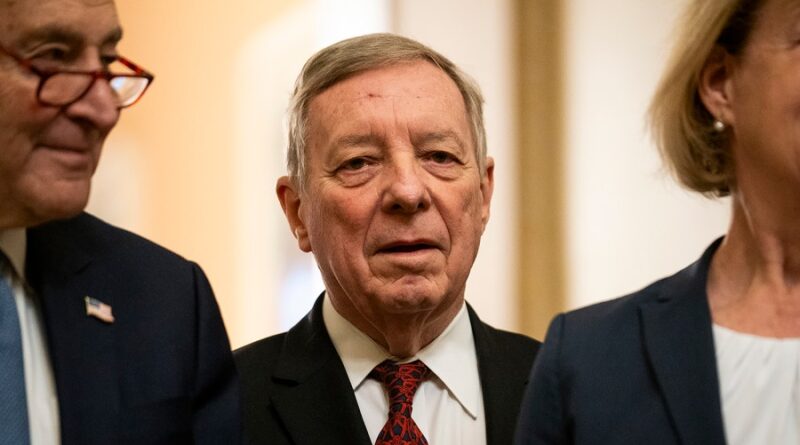Durbin asks DOJ to clarify scope of president’s military power ahead of Trump inauguration

Sen. Dick Durbin (D-Ill.), the top Democrat on the Senate Judiciary Committee, is urging the Department of Justice (DOJ) to rescind a number of internal opinions dealing with a president’s military powers while asking for clarification on domestic use of America’s forces.
The letter to Attorney General Merrick Garland comes less than two weeks before President-elect Trump is set to take office and asks the Justice Department to make clear the bounds of the president’s authority on a number of fronts.
The letter, obtained by The Hill, refers to a cache of opinions crafted by the Office of Legal Counsel (OLC), which houses the department’s own legal advisers and sets guidelines on various legal matters.
Durbin asked the office to release its opinions on the extent to which presidents can use the military domestically, a request that comes as Trump has said he will use the armed forces to help carry out the largest deportation operation the country has seen.
“I request that the Department of Justice publicly release opinions and manuals pertaining to the domestic use of the U.S. military. For decades, OLC has issued guidance on the circumstances in which the President may deploy the military within the United States, as well as what servicemembers may do when so deployed,” he wrote, noting that some of those documents have not been made public.
“The American people have a right to know how the Executive Branch interprets the President’s constitutional and statutory authority to use the military domestically. The need for transparency regarding these legal interpretations is particularly urgent today given the risk of domestic military deployment to suppress protests or carry out mass deportations.”
The Justice Department acknowledged receipt of the letter but declined to comment.
The Justice Department is a top focus of those concerned about a second Trump administration.
Trump has tapped former Florida Attorney General Pam Bondi to be attorney general while slating other top slots at DOJ to be filled by his personal defense team from his criminal trials.
He’s also tapped loyalist Kash Patel, who wrote a book with a list of “government gangsters” he has said must be held accountable, to lead the FBI.
Durbin’s letter also asks Garland to withdraw five OLC memos that might otherwise guide Trump’s team, saying the memos “contain conclusions that are inconsistent with Congress’s constitutional prerogatives with respect to war, Congress’s role in treaty-making, and/or the President’s duty under the Take Care Clause” to make sure laws are faithfully executed.
One 1989 opinion greenlighting the FBI’s ability to apprehend people overseas would allow a president to “override” the U.N. charter’s prohibition on the use of force, Durbin said.
Another opinion deals with the president’s power to withdraw from treaties, with the OLC under Trump determining that presidents don’t have to notify Congress of such moves.
But Durbin said such advice undercuts a provision passed in last year’s defense policy bill that requires any suspension or withdrawal from the North Atlantic Treaty Organization to be approved by a two-thirds majority of the Senate or an act of Congress.
Trump has waffled on his feelings about NATO, musing about withdrawing from the military alliance during his first term in office even though as recently as Tuesday he floated that member nations should spend 5 percent of their economic output on military spending rather than the current 2 percent.
At the same press conference, Trump also wouldn’t rule out using military force in Greenland, a NATO member, and Panama.
Two others OLC writings deal with the president’s ability to use the military without the consent of Congress, drafted at the height of the U.S. response to 9/11. Durbin said these documents are “inconsistent with OLC’s own war powers doctrine, which recognizes that ‘war in the constitutional sense’ requires congressional authorization.”
A final opinion justifying the 2020 killing of Iranian General Qassem Soleimani should also be withdrawn, Durbin argues, as it likewise does not square with OLC guidance about seeking congressional approval in order to declare war.
“Congress and the executive branch may have differing views in some respects as to the separation of powers between them. However, these opinions are concerning outliers even by the standards of the executive branch’s own legal doctrine. Indeed, it does not appear that OLC has relied upon these opinions in other publicly available legal memoranda,” Durbin wrote in arguing they should be withdrawn.

